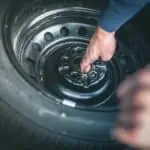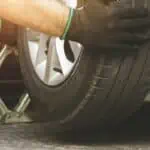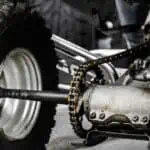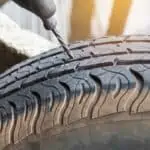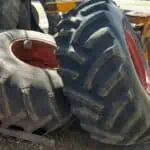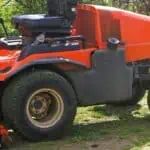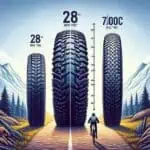If you have a tubeless lawn mower tire, you may be wondering how to seat it. Seating a tubeless tire is not as difficult as it may seem. Here are some simple instructions on how to do it.
- Park your lawn mower on a level surface and turn off the engine
- Use a lug wrench to loosen the bolts on the wheel
- You may need to use a cheater bar to get enough leverage
- Remove the wheel from the axle and set it aside
- Inspect the tire for any damage and clean out any debris from the inside of the rim
- Place the tire onto the rim and line up the holes
- 6-7 Insert one side of the Beadlock into each hole and then gently push down on both sides until they snap into place, making sure that they are evenly seated all the way around
How to Seat a Tubeless Lawn Mower Tire?
How Do You Seat a Bead on a Lawnmower Tire?
It is important to know how to seat a bead on a lawnmower tire properly so that the tire can function correctly and provide a smooth ride. There are a few steps that need to be followed to do this correctly. The first thing that needs to be done is to deflate the tire completely.
This will make it easier to work with and allow you to get a better seal when seating the bead. Once the tire is deflated, use a screwdriver or similar tool to pry the old bead off of the wheel. Next, clean the wheel rim thoroughly so that there is no dirt or debris present which could prevent the new bead from sealing properly.
Once the rim is clean, lightly lubricate it with soapy water or baby powder. This will help the new bead slide into place more easily. Now it’s time to install the new bead.
Start by sliding one end of the bead over the edge of the wheel rim. Then work your way around, gently pushing and pulling until the entire bead is in place. It’s important not to stretch or damage the bead during this process.
How Do You Seat a Tubeless Tire on a Rim?
Tubeless tires are becoming increasingly popular, as they offer several advantages over traditional clincher tires. They’re easier to set up, seal more effectively, and weigh less. But how do you actually seat a tubeless tire on a rim?
The first step is to make sure your rim is compatible with tubeless tires. Most modern rims are, but it’s always best to check before you start. Once you’ve confirmed that your rim will work with a tubeless tire, it’s time to get started.
Begin by putting just enough air in the tire so that it holds its shape. You don’t need much air at this stage – just enough to give the tire some structure. Next, locate the valve stem and unscrew the cap.
Using a tubeless valve tool (or a Presta valve with the core removed), thread the valve into the hole in the rim. Now it’s time to add some sealant. Sealant is essential for keeping the air in a tubeless tire, as it plugs any small holes that might otherwise allow air to escape.
Pour or inject about 30-40ml of sealant into the tire through the valve stem. Once you’ve added sealant, re-attach the valve cap and inflate the tire to its recommended pressure – usually around 60psi for road tires and 40-50psi for mountain bike tires. If all has gone well, you should now have a properly seated tubeless tire!
If not, don’t despair – often it can take a few attempts to get everything lined up correctly and get an airtight seal. Just keep trying and eventually, you’ll succeed!
How Do You Seal a Lawn Mower Tire on a Rim?
If you have a lawn mower with pneumatic tires, it’s important to keep them properly inflated and sealed. Otherwise, they can become damaged or even burst. Fortunately, sealing a lawn mower tire on a rim is a relatively easy process.
Here’s what you need to do:
1. First, clean the area around the valve stem with a rag or brush. This will help ensure that the sealant adheres properly.
2. Next, use a tire gauge to check the pressure of the tire. It should be between 18 and 22 PSI for most lawnmowers. If it’s low, inflate it using a hand pump or compressor.
3. Once the tire is at the proper pressure, remove the valve cap and insert the nozzle of a tube of tire sealant into the valve stem opening. Squeeze the trigger on the sealant bottle to dispense it into the tire until it’s full (usually just takes a few seconds).
4. Finally, replace the valve cap and press down on the tire to distribute the sealant evenly inside.
That’s it!
How Do You Fix a Tubeless Lawn Mower Tire?
If you have a tubeless lawn mower tire, the first thing you need to do is check the air pressure. If the tire is low on air, add more air until it is at the recommended pressure. If the tire is flat, you will need to use a tube or patch to fix it.
To do this, remove the wheel from the mower and take it to a local repair shop.
Tire Bead Seating Tricks
Are you having trouble getting your tires to seat properly? If so, you’re not alone. It’s a common problem that can be frustrating, but there are a few tricks that can help.
One trick is to use a bead seater. This is a tool that goes over the tire and helps to seat the bead. You can usually find them at auto parts stores or online.
Another trick is to inflate the tire with air, then let it sit for a while before trying again. This gives the bead time to seat itself. If you’re still having trouble, it might be time to take it to a professional.
They have the tools and experience to get the job done right.
How to Seal Lawn Mower Tire to Rim
It’s important to keep your lawn mower in good working order, and that includes making sure the tires are properly inflated and sealed. If you’re not sure how to do this, don’t worry – it’s easy! Here’s a quick guide on how to seal lawn mower tire to rim:
1. Start by inflating the tire to the proper pressure. You can find this information in the owner’s manual for your mower.
2. Next, use a putty knife or similar tool to apply a bead of sealant around the circumference of the tire. Make sure to get an even layer so that it will adhere properly.
3. Now, take a piece of cardboard or something similar and press it firmly against the sealant-covered area. This will help smooth out any air bubbles and ensure a good seal.
4. Finally, let the sealant dry for at least 24 hours before using your mower again. This will give it time to set up properly and create a strong bond between the tire and rim.
How to Inflate a Large Tractor Tire
If you have ever wondered how to inflate a large tractor tire, wonder no more! Inflating a tractor tire is not as difficult as one might think. All you need is an air compressor and an air hose that can reach the tire.
First, park the tractor on level ground and put on the parking brake. Next, locate the Schrader valve stem on the tire. The Schrader valve is located in the center of the stem cap.
If there is no stem cap, then look for a small metal pin in the center of the valve opening.
Now, attach your air compressor to the hose and open up the valve to release air into the tire. Fill up the tire until it reaches its recommended pressure level (this information can be found on either side of the tire).
Once you have reached this level, close off the valve and disconnect your air compressor from the hose.
How to Fix Lawn Mower Tire
If you have a lawn mower, chances are you will eventually need to know how to fix a lawn mower tire. This is not a difficult task, but one that does require some basic knowledge and tools. Here are the steps you’ll need to take to fix your lawn mower tire:
1. First, you’ll need to identify the problem. Is the tire flat? Has it been punctured? If so, locate the hole and determine what caused it.
2. Once you’ve identified the problem, you can begin to fix it. For a flat tire, simply inflate the tire to its proper pressure using an air compressor or bike pump. If the tire has been punctured, use a plug kit or patch kit to repair the hole. These kits can be found at most hardware stores.
3. After repairing the hole in the tire, re-inflate it to its proper pressure and re-install it on the lawn mower.
Be sure to tighten all of the bolts securely before operating the lawn mower again. That’s all there is to it! By following these simple steps, you can easily fix a lawn mower tire yourself without having to call for professional help.
Seating Stubborn Tire Beads
If you’ve ever had a flat tire, you know the importance of a good seal between the wheel and the tire. This is what’s known as the “bead” of the tire, and it’s crucial to keeping the air in (and water and dirt out). Unfortunately, sometimes the bead can be stubborn and difficult to seat properly.
Here are a few tips for seating those pesky beads:
– Use soapy water: This can help lubricate the bead and make it easier to seat. Just be sure to rinse off any soap residue before pumping up your tire.
– Use a rim guard: If you have one, this can help protect your wheel from scratches as you work on getting the bead seated.
– Use a lever: You can use a screwdriver or other tool to help pry the bead over the edge of the wheel. Just be careful not to damage either component.
With these tips in mind, seating even stubborn tire beads should be a breeze!
Conclusion
If you’re not familiar with the process of seating a tubeless lawn mower tire, it can seem daunting. But don’t worry – we’ll walk you through the steps so that you can get your mower back up and running in no time.
First, make sure that your tire is properly inflated.
Next, locate the valve stem on the tire and remove the cap. Then, use a soap solution to lubricate the bead of the tire. Once the bead is lubricated, fit the wheel onto the rim and inflate the tire again until it’s snug against the rim.
Now it’s time to seat the bead. To do this, deflate the tire slightly and then quickly re-inflate it while holding down on one side of the tire with your hand. The sudden increase in pressure will help seat the bead against the rim.
Repeat this process on both sides of the tire until it’s fully seated.
Once you’ve seated both beads, re-inflate your tire to its proper pressure and replace any caps or covers that were removed during installation. And that’s it!
